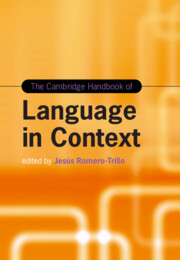Book contents
- The Cambridge Handbook of Language in Context
- Cambridge Handbooks in Language and Linguistics
- The Cambridge Handbook of Language in Context
- Copyright page
- Contents
- Figures
- Tables
- Contributors
- Acknowledgments
- Language in Context Studies
- Part I Language in Context: A Sociohistorical Perspective
- Part II Philosophical, Semantic, and Grammatical Approaches to Context
- Part III Pragmatic Approaches to Context
- 8 The Role of Context in Gricean and Neo-Gricean Pragmatics
- 9 Sociopragmatics and Context
- 10 Natural Semantic Metalanguage and Context
- 11 Relevance Theory and Context
- 12 The Interplay of Linguistic, Conceptual, and Encyclopedic Knowledge in Meaning Construction and Comprehension
- 13 Corpus Pragmatics
- 14 Prosodic Pragmatics in Context
- Part IV Applications of Context Studies
- Part V Advances in Multimodal and Technological Context-Based Research
- Index
- References
12 - The Interplay of Linguistic, Conceptual, and Encyclopedic Knowledge in Meaning Construction and Comprehension
from Part III - Pragmatic Approaches to Context
Published online by Cambridge University Press: 30 November 2023
- The Cambridge Handbook of Language in Context
- Cambridge Handbooks in Language and Linguistics
- The Cambridge Handbook of Language in Context
- Copyright page
- Contents
- Figures
- Tables
- Contributors
- Acknowledgments
- Language in Context Studies
- Part I Language in Context: A Sociohistorical Perspective
- Part II Philosophical, Semantic, and Grammatical Approaches to Context
- Part III Pragmatic Approaches to Context
- 8 The Role of Context in Gricean and Neo-Gricean Pragmatics
- 9 Sociopragmatics and Context
- 10 Natural Semantic Metalanguage and Context
- 11 Relevance Theory and Context
- 12 The Interplay of Linguistic, Conceptual, and Encyclopedic Knowledge in Meaning Construction and Comprehension
- 13 Corpus Pragmatics
- 14 Prosodic Pragmatics in Context
- Part IV Applications of Context Studies
- Part V Advances in Multimodal and Technological Context-Based Research
- Index
- References
Summary
One of the most complicated issues of present-day linguistics is the relationship of three types of knowledge: linguistic knowledge, conceptual knowledge, and encyclopedic knowledge. After discussing the complexity of their interplay from different perspectives, the chapter presents a model to explain their relationship. The model has linguistic knowledge on one side, and the sociocultural background knowledge (world knowledge) on the other side. There is constant interaction between the two sides in language use. For analytic reasons, within the sociocultural background knowledge there a distinction is made between conceptual knowledge and encyclopedic knowledge. According to this model, meaning is constructed in the dynamic interplay of actual situational context and lexical items, with the context representing the actual, present, situational, ever-changing side of sociocultural background and the lexical item(s) embodying previous experiences and relations in the sociocultural background. The lexical items with their semantic properties (linguistic knowledge) represent prior reoccurring experience (conceptual knowledge), and the actual situational context triggers the other part of world knowledge that we previously called encyclopedic knowledge. The difference between the two types of sociocultural background knowledge is that the conceptual knowledge part is immediately tied to linguistic knowledge while the other type of sociocultural background knowledge (encyclopedic knowledge) is called upon as needed in language use.
Keywords
- Type
- Chapter
- Information
- The Cambridge Handbook of Language in Context , pp. 268 - 288Publisher: Cambridge University PressPrint publication year: 2023
References
- 1
- Cited by

